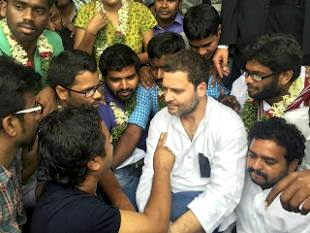Hyderabad, Jan 30: Stepping up the offensive on Dalit scholar suicide issue, Rahul Gandhi today commenced a day-long fast along with agitating students of Hyderabad Central University here after participating in a candle light vigil in the wee hours.
 The Congress Vice President spent about two hours with agitating students past midnight and participated in the candle light vigil along with 2,000 students to mark the birthday of Rohith, who would have turned 27 today.
The Congress Vice President spent about two hours with agitating students past midnight and participated in the candle light vigil along with 2,000 students to mark the birthday of Rohith, who would have turned 27 today.
Rahul returned to the protest site this morning to begin the fast, expressing solidarity with them. "Rahulji is on fast," NSUI President Roji M John said.
Rahul, who is visiting the campus for the second time in as many weeks, tweeted, "I am here today at the request of Rohith's friends and family, to stand with them in their fight for justice.
"A young life full of dreams and aspirations was cut short. We owe it to him, to the memory of (Mahatma) Gandhiji and to every single Indian student who dreams of an India free from prejudice and injustice," he said in another tweet.
Rohith's mother Radhika and brother Raju were also present at the protest site.
Gandhi, who arrived here at 12.10 AM, spoke to the agitating students and lit candles before Rohith's picture.
As students raised slogans against Irani and Dattaretreya, Rahul intervened and politely told them not to shout 'murdabad' (a slogan wishing death to).
"Let us not say 'murdabad' to somebody. That will not do justice," he said. Velpula Sunkanna, one of the research scholars whose suspension was revoked recently, said Vice-Chancellor Appa Rao Podile should be removed from the VC post.
"On January 17, we have filed SC/ST Atrocities case against Appa Rao and (five) others. These six people should be arrested immediately. Thats the only demand," Sunkanna, who is on an indefinite fast along with Vijay Kumar (another scholar whose suspension was revoked), said.
On Rahul Gandhi's second visit to the campus, he said, "I look at it the way others..Arvind Kejriwal, Sitaram Yechury, CPI leaders and many people who came and supported us do. The same way we see Rahul Gandhi".





Comments
Add new comment